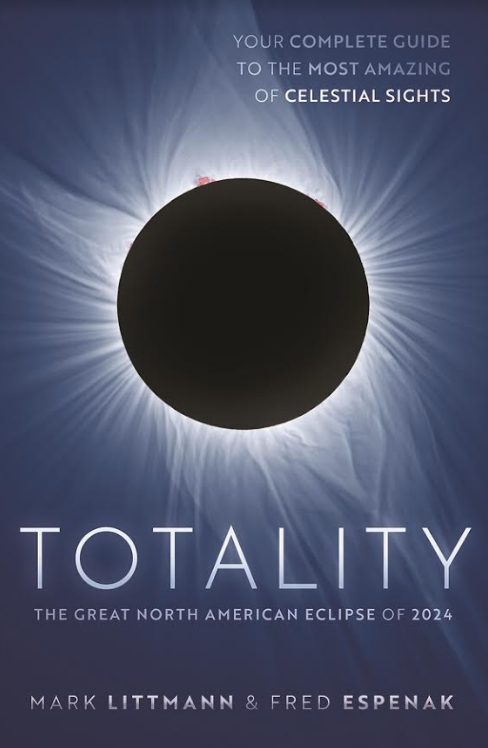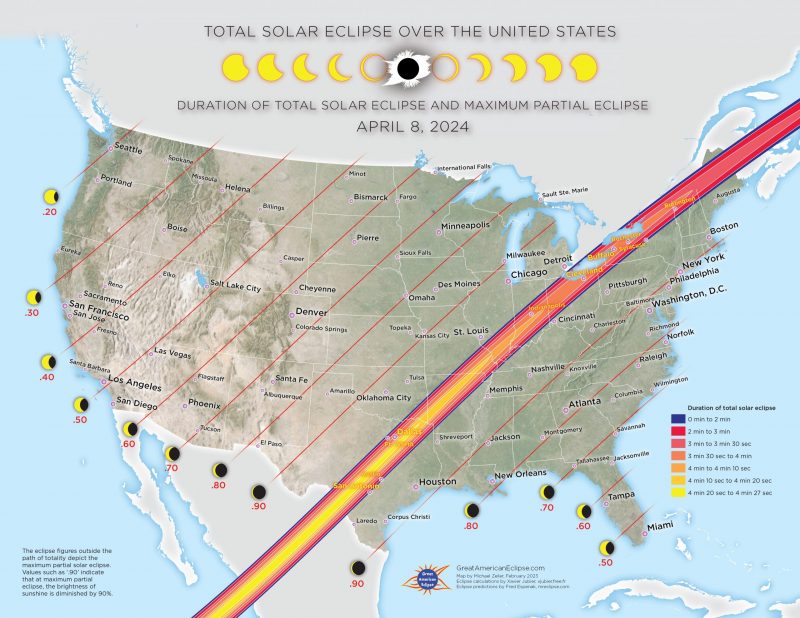
Book review for “Totality”
Oscar Wilde once quipped that a book exhausting its subject only succeeds in exhausting its readers. I’m proud to present a book that stands as a notable exception to this rule: Totality: The Great North American Eclipse of 2024 by Mark Littmann and Fred Espenak. It’s one of the most enjoyable reads that I’ve had in a long time.
Edifying as well as entertaining, Littmann and Espenak masterfully interweave eclipse history, folklore, superstition, geography, science and technology. “Totality” is sure to charm people across the board, from novice to maven. The friendly and conversational style almost makes one forget to be intimidated by technicalities.
The 2024 lunar calendars are here! Best Christmas gifts in the universe! Check ’em out here.
Totality is nature’s grandest visual spectacle
Yes, a whole cavalcade of geeks contributed to the production of this great opus. Even so, these eclipse aficionados are more interested in sharing their joyous passion than in imposing a dissertation upon you. They – as much as anyone – can sympathize with the exasperating words of Alfonso X, King of Castile (1252), who complained:
If God had consulted with me before embarking upon creation, I would have recommended something simpler.
The theme of the book is simple and can’t be repeated often enough: A total eclipse of the sun counts as nature’s grandest visual spectacle. In fact, an eclipse chaser who witnessed 30 total solar eclipses hardly exaggerates in proclaiming:
In rating natural wonders, on a scale of 1 to 10, a total eclipse of the sun is a million.
Total solar eclipse once in 375 years
A total solar eclipse only comes once to your part of the world in an average of 375 years. If you live in North America, and the path of this upcoming total solar eclipse passes through your neighborhood, take full advantage. That’ll probably be your once-in-lifetime opportunity to witness a total eclipse of the sun in your own backyard. Absolutely nothing compares to the ultimate experience of standing inside a moon shadow.
Alas, the average figure of 375 years stated above proves to be quite misleading overall. For instance, people in Carbondale, Illinois, get to see two total solar eclipses in the span of seven years (2017 and 2024). Yet, the next total solar eclipse in Antwerp, Belgium, (on May 25, 2142) will be the first to occur there in at least seven centuries. (According to Jean Meeus in Mathematical Astronomy Morsels I, page 92.) No wonder King Alfonso X admonished the creator for the hard-to-fathom cosmos.

Treasure trove of information
The authors are begging and pleading with all those living on or near the path of the total solar eclipse (and those willing to travel) to enjoy nature’s greatest visible spectacle. Most likely, another total eclipse of the sun won’t happen in your neck of the woods for hundreds of years. So let this treasure trove of information ready you for the thrill of a lifetime.
Our tour guides – Mark Littmann and Fred Espenak – say in way of conclusion:
If the weather cooperates, the total eclipse of the sun on April 8, 2024, could mark the biggest outdoor spectator event in American history – a 2,140-mile-long (3,444-km-long) tailgate party to watch the heavenly performance of the moon and sun.
Bottom line: Read a book review of “Totality: The Great North American Eclipse of 2024” by Mark Littmann and Fred Espenak. Reviewed by Bruce McClure.
The post Media we love: Totality, The Great North American Eclipse of 2024 first appeared on EarthSky.
from EarthSky https://ift.tt/2ptXMOP

Book review for “Totality”
Oscar Wilde once quipped that a book exhausting its subject only succeeds in exhausting its readers. I’m proud to present a book that stands as a notable exception to this rule: Totality: The Great North American Eclipse of 2024 by Mark Littmann and Fred Espenak. It’s one of the most enjoyable reads that I’ve had in a long time.
Edifying as well as entertaining, Littmann and Espenak masterfully interweave eclipse history, folklore, superstition, geography, science and technology. “Totality” is sure to charm people across the board, from novice to maven. The friendly and conversational style almost makes one forget to be intimidated by technicalities.
The 2024 lunar calendars are here! Best Christmas gifts in the universe! Check ’em out here.
Totality is nature’s grandest visual spectacle
Yes, a whole cavalcade of geeks contributed to the production of this great opus. Even so, these eclipse aficionados are more interested in sharing their joyous passion than in imposing a dissertation upon you. They – as much as anyone – can sympathize with the exasperating words of Alfonso X, King of Castile (1252), who complained:
If God had consulted with me before embarking upon creation, I would have recommended something simpler.
The theme of the book is simple and can’t be repeated often enough: A total eclipse of the sun counts as nature’s grandest visual spectacle. In fact, an eclipse chaser who witnessed 30 total solar eclipses hardly exaggerates in proclaiming:
In rating natural wonders, on a scale of 1 to 10, a total eclipse of the sun is a million.
Total solar eclipse once in 375 years
A total solar eclipse only comes once to your part of the world in an average of 375 years. If you live in North America, and the path of this upcoming total solar eclipse passes through your neighborhood, take full advantage. That’ll probably be your once-in-lifetime opportunity to witness a total eclipse of the sun in your own backyard. Absolutely nothing compares to the ultimate experience of standing inside a moon shadow.
Alas, the average figure of 375 years stated above proves to be quite misleading overall. For instance, people in Carbondale, Illinois, get to see two total solar eclipses in the span of seven years (2017 and 2024). Yet, the next total solar eclipse in Antwerp, Belgium, (on May 25, 2142) will be the first to occur there in at least seven centuries. (According to Jean Meeus in Mathematical Astronomy Morsels I, page 92.) No wonder King Alfonso X admonished the creator for the hard-to-fathom cosmos.

Treasure trove of information
The authors are begging and pleading with all those living on or near the path of the total solar eclipse (and those willing to travel) to enjoy nature’s greatest visible spectacle. Most likely, another total eclipse of the sun won’t happen in your neck of the woods for hundreds of years. So let this treasure trove of information ready you for the thrill of a lifetime.
Our tour guides – Mark Littmann and Fred Espenak – say in way of conclusion:
If the weather cooperates, the total eclipse of the sun on April 8, 2024, could mark the biggest outdoor spectator event in American history – a 2,140-mile-long (3,444-km-long) tailgate party to watch the heavenly performance of the moon and sun.
Bottom line: Read a book review of “Totality: The Great North American Eclipse of 2024” by Mark Littmann and Fred Espenak. Reviewed by Bruce McClure.
The post Media we love: Totality, The Great North American Eclipse of 2024 first appeared on EarthSky.
from EarthSky https://ift.tt/2ptXMOP

Aucun commentaire:
Enregistrer un commentaire